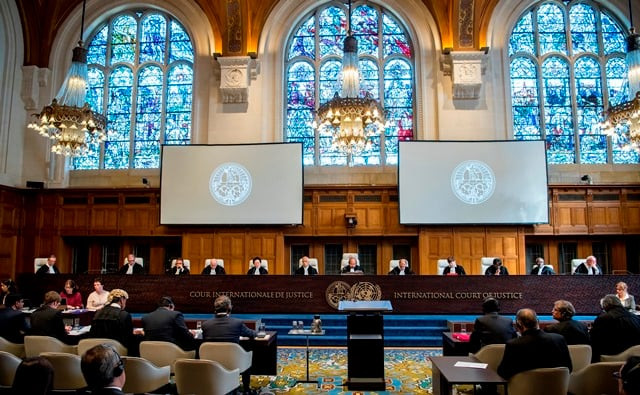Pakistan restricted ICJ jurisdiction in March: AG
AG Ausaf Ali refutes reports claiming Pakistan agreed to ICJ remit in March this year as 'a sinister move'

International Court of Justice holds hearing of the case. PHOTO: ICJ
Dispelling the impression that Pakistan agreed to the jurisdiction of the ICJ in such cases only in March this year, he said Pakistan had signed an unconditional declaration to agree to the jurisdiction of the world court way back in September 1960. "Pakistan had signed an unconditional declaration to agree to the jurisdiction of the ICJ way back in September 1960. In March 2017, we made a declaration of exceptions reservations and conditions", said Ausaf.
The AG’s statement came following confusion that Pakistan had agreed to the jurisdiction of the international court in March this year for the first time.
ICJ stays Jadhav’s hanging till it makes final ruling
“An impression is being created as if we agreed to compulsory jurisdiction of the ICJ in March 2017 with a sinister motive. This is not true. We had become signatories to a declaration of submission to jurisdiction without any exceptions in September 1960,” the statement said.
“In March, 2017, we created firewalls, including the one relating to security of Pakistan, for the first time," it added.
The AG said the ICJ is looking at the Vienna Convention and the optional protocol as both Pakistan and India are signatories to it. This optional protocol invests the ICJ with powers and jurisdiction to decide disputes between member states, he said.
India's ICJ petition attempts to divert attention from its support of terrorism in Pakistan: Kh Asif
"There is no design or sinister motive behind the conditional reservation made this year. If we were to withdraw this declaration we would have to go back to the 1960 declaration which gives jurisdiction without exceptions," Ausaf said adding that ICJ is looking at Vienna Convention aspect and not the one being referred to on social and electronic media.
The debate on the jurisdiction of the he United Nations’ top court started when it ordered on May 18 a stay in the execution of Kulbhushan Jadhav, the self-confessed Indian spy convicted by Pakistan for carrying out subversive activities in the country.
Judges at ICJ ruled that Jadhav must not be put to death by Islamabad until they have had time to pass final judgement in the case.
The ICJ was set up in 1945 to rule on disputes between nations in accordance with international law. The Vienna Convention has been a frequent subject of disputes at the ICJ, often in cases involving the United States. US authorities ignored a similar ICJ injunction in 1999 and executed a German national.
The last time India and Pakistan took a dispute to the ICJ was in 1999 when Islamabad protested the downing of a Pakistani navy plane that killed 16 people. But the tribunal decided it was not competent to rule in the dispute and closed the case.



















COMMENTS
Comments are moderated and generally will be posted if they are on-topic and not abusive.
For more information, please see our Comments FAQ